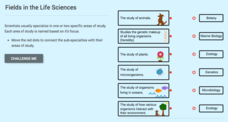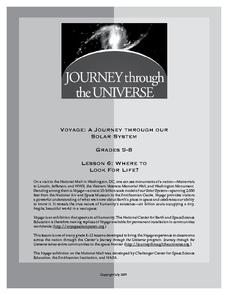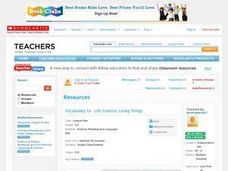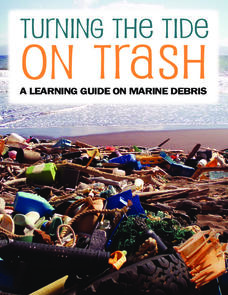CK-12 Foundation
Fields in the Life Sciences
Many fields of study require a specialty and a sub-specialty as you progress through your education. Scholars learn about six sub-specialties of life science. From botany to zoology, our knowledge of the world of living organisms expands...
Scholastic
Study Jams! The Kingdoms of Life
Life science learners discuss the characteristics of five kingdoms of life: animals, plants, fungi, protists, and bacteria in this video. Viewers find out from the dialogue that scientists group organisms according to similarities. This...
Curated OER
Vocabulary 2c - Life Science: From Parents to Young
This life science vocabulary list and definitions will be useful when teaching a parent and offspring unit. Some nice ideas are included in the plan about the word origins, word structure and definition testing methods. There is also a...
Curated OER
Life Science: Living Things
Have your class build their vocabulary bank by studying life science terms. Basic terms like organism, cell, unicellular, and vertebrate are included on the definition sheet provided. Demonstrate how to identify different life science...
Curated OER
Science Crossword Puzzles: Life Science
Review some simple life science terms using this short and simple crossword puzzle. Young scientists find 6 terms about photosynthesis and other life science topics using provided clues and then plug them into a crossword.
Teachit
Life Cycle of a Penguin
Celebrate the circle of life with this fun hands-on activity. After cutting out, gluing together, and assembling this visual model, students are able to spin through and observe the life cycle of penguins.
Ask a Biologist
It’s a Plankton Eat Plankton World
For as small as they are, plankton sure play an enormous role in maintaining marine ecosystems. Dive into an investigation of these tiny organisms with a hands-on life science activity in which children cut out pictures of sea animals...
Curated OER
How to Use Classroom Animals to Spark Life Science Inquiry
Use low maintenance classroom pets to get your students engaged in life science inquiry investigations.
Teach Engineering
Life Cycles
Breathe some life into product design. Pupils learn about the stages of product creation, use, and disposal—sometimes called a cradle-to-grave assessment. They see how this cycle relates to the life cycle of organisms.
Curated OER
Ocean Life
Mini-marine biologists use Scholastic Explorers website to learn about declining numbers of leatherback sea turtles and dusky dolphins. They fill out a K-W-L chart and observation journal worksheet, which are both provided in the lesson...
Journey Through the Universe
Where to Look For Life?
Every year we discover new planets including more than 1,000 in 2016 alone. Will we ever find life on another planet? The lesson includes two activities to help scholars understand this concept. First, they analyze the temperature range...
Curated OER
Jeopardy: Science
Need a science activity for a rainy day? This Jeopardy game is a perfect way to keep students entertained while they are stuck inside for recess. The five categories are: Things that Grow, Animals, Geology, Weather, and It's Electric....
Curated OER
Life Science: Plant Life Cycles
Practice defining words that have to do with plant life cycles. The list included here is mainly for structural units, but could be used to review their relevance and the process of the life cycle.
Curated OER
Vocabulary 1a: Life Science: Living Things
Life science vocabulary comes alive through repeated exposure. With the instructor, words are defined and posted in the classroom. Learners repeat the definitions in their own words and review them often. Extension ideas and links are...
BBSRC
Discovering DNA: The Recipe for Life
A pinch of adenine, a dash of thymine and ta-da, you have life! Well, it's not quite that simple, but through this series of activities and experiments young scientists learn about the structure of DNA and how it contains the recipe for...
National Science Teachers Association
Hop into Action
Young scientists find out what makes amphibians such unique and interesting animals in this simple life science lesson. After looking at pictures and discussing the characteristics of amphibians, learners complete a series of three Venn...
NOAA
Turning the Tide on Trash: A Learning Guide on Marine Debris
The lessons in this learning guide are designed to increase youngsters' awareness of the impacts of marine debris and to teach them about pollution prevention techniques. This fabulous, 30-page packet is chock full of important...
Curated OER
Turning the Tide on Trash: Marine Debris Curriculum
Seven pages of fascinating reading on marine debris preface the activities in this lesson plan. Four different activities are employed to simulate how the debris is distributed in the ocean and along beaches. Early ecology learners...
University of Colorado
Is There Life on Earth?
To find life on another planet, scientists look for gases (atmosphere), water, and temperatures that are not extreme. In this activity, groups of pupils become "Titan-ians," scientists who want to explore Earth for possible life forms....
Newspaper Association of America
Cereal Bowl Science and Other Investigations with the Newspaper
What do cereal, fog, and space shuttles have to do with newspapers? A collection of science investigations encourage critical thinking using connections to the various parts of the newspaper. Activities range from building origami seed...
G. Turrell
Science Activity 1: Light & Sound
Are you looking for lab sheets to go with your class experiment on plant response to light? You are no longer in the dark! This is a lesson that was written for a unit on light, but could easily be used to demonstrate plant behaviors in...
Berkshire Museum
The Three Life-Giving Sisters: Plant Cultivation and Mohican Innovation
Children gain first-hand experience with Native American agriculture while investigating the life cycle of plants with this engaging experiment. Focusing on what the natives called the Three Sisters - corn, beans, and squash - young...
Journey Through the Universe
Is There Anyone Out There?
What is an alien's favorite game? All-star baseball! Scholars start defining living and non-living. Then, they conduct experiments to research if life exists, keeping in mind that life could be in many forms, not just human.
NASA
The Science of the Sun
There's more to that glowing ball of light in sky than most children realize. From the overall structure of the solar system, to the changing of the seasons, these hands-on lessons open the eyes of young scientists to the important role...
Other popular searches
- 4th Grade Life Science
- Life Science Inquiry
- Life Science Vertebrates
- Life Science Experiments
- K 2 Life Science
- Life Science on Cells
- Life Science Lesson Plans
- Grade 4 Life Science
- Life Science Report Topic
- Australia Life Science
- The Life Science
- Life Science Lessons

























